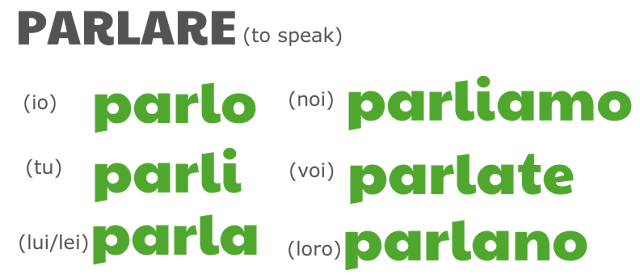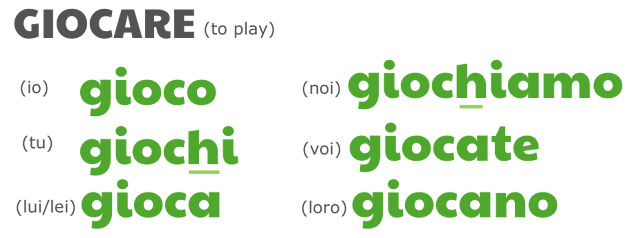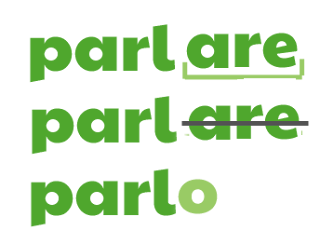OUR NEW NAME AND ADDRESS IS VIA OPTIMAE! {www.viaoptimae.com}
Didattichiamo! will slowly be phased out, so read this post on our new site and subscribe by email to receive our latest updates.
As I said in: How Italian verbs work, (Start there if you missed it!— UPDATE: redirects to same post on the new site, Via Optimae) Italian verbs are all about knowing how to identify the stem, and add the appropriate ending for each subject/tense.
Today, we're going to look at the Simple Present Tense and in particular, -ARE verbs:
[We'll cover -ERE and -IRE forms at a later date —Again, review How Italian verbs work (redirects you to the same post on the new site, Via Optimae) in case you're not sure what that means]
To conjugate -ARE verbs in the simple present tense, just drop the -ARE from the infinitive form, and add one of the following endings:
So, if I wanted to conjugate the regular verb: 'parlare' in the first person singular or 'io' it would look like this:
Parlo
I speak
Parlo l'italiano.
I speak Italian.
↓

-Parli l'italiano?
Do you speak Italian?
-Sì, parlo l'italiano.
Yes, I speak Italian.
-Parlano l'italiano?
Do they speak Italian?
-No, parlano l'inglese.
No, they speak English.
Using the above examples as clues, how would you say: "We speak Italian." ? ("We" is "noi", review subject pronouns if needed in: How Italian Verbs Work)
[Highlight below to reveal answer]
Parliamo l'italiano.
Here are some other regular -ARE verbs:
portare - to bring
amare - to love
arrivare - to arrive
trovare - to find
Can you write out the present tense conjugations for each?
↓
~ I recommend writing them out in a two column, three row table format so that you can refer back to them easily… You can also use one of the following free printable PDFs… Choose either blank or with a quick summary:
UPDATE: Worksheet links will redirect you to this post on the new site, Via Optimae
 |
| Blank conjugation tables (Blank so you can use them to practice any tense conjugation) |
-or-
 |
| Italian simple present tense -ARE Summary and tables (A summary of this lesson next to blank tables to help you practice.) |
~
You can verify your answers or look up the conjugation for any verb/tense in Word Reference's handy conjugator:
. . . |
| The simple present tense is the first column of the first row labeled "presente." |
Spell-change verbs
There are other verbs that are regular, except when you add the regular endings, it creates weird letter combinations or sounds in Italian. These are called Spell-change verbs.
One example is mangiare. If you simply drop the -ARE as you are supposed to and conjugate, you will get the following forms:
io mangio✓
tu mangii ✗ (why so many i's?, should be mangi)
lui/lei mangia ✓
noi mangiiamo ✗ (again, why so many i's? should be mangiamo)
voi mangiate ✓
loro mangiano ✓
To avoid the "too many i's syndrome", you just drop one of them… A quick spelling change so that you're left with normal forms:
Other Spell-change verbs add an "h" to some of the forms so that the verb maintains its original sound. This is because of how "c" and "g" are pronounced depending on the vowel that follows.
"C" when followed by an "o", "a", or "u" makes a hard sound, like a "k" in English:
to play
"C" when followed by an "i" or an "e" makes a sound like "ch" in English:
When you conjugate 'giocare' in the present tense following the normal rules, you'll get the following:
io gioco✓ (the "c" maintains its "k" sound)
tu gioci ✗ (oops the "c" is like "ch" we need an h! giochi✓)
lui/lei gioca ✓
noi giociamo ✗ (again, our "c" is now "ch" we need an h! giochiamo✓)
voi giocate ✓
loro giocano ✓
The "h" in the above examples tells readers: "Say this like a k!" By adding the "h" we maintain the original sound of the verb. All the correct forms:
 |
| Now with the "h" all the forms maintain the same "k" sound as the original infinitive "giocare" |
Similarly, "g" also makes a "hard" sound (like the "g" in "great) when followed by "a", "o", or "u":
to pay
When followed by a "e" or "i" the "g" becomes "soft" like the "j" in English 'judge'.
just, fair
When you conjugate 'pagare' in the present tense following the normal rules, you'll get the following:
io pago✓ (the "g" maintains its hard sound)
tu pagi ✗ (oops the "g" is now like "j" of judge we need an h! paghi✓)
lui/lei paga ✓
noi pagiamo ✗ (again, our "g" has changed, we need an h! paghiamo✓)
voi pagate ✓
loro pagano ✓
The "h" in the "tu" and "noi" forms tells us to keep the hard sound, so now all the forms have the same "g" sound as the original infinitive:
[Again, you can use either the blank conjugation tables or the conjugation tables plus -ARE present tense review as worksheets, if desired.]
to praise
to be missing
to tie, fasten
That's it for now on -ARE verbs... keep practicing until the forms become natural to you. Use the words in the image at the beginning of the post- they're all regular or spell-change -ARE verbs!
Happy Conjugating!
-Alex
Ready to move on to the next lesson in this series?
TRY: Italian Present Tense: -ERE verbs (redirects you to new site, Via Optimae)
Try this free online -ARE verb conjugation exercise:












No comments :
Post a Comment